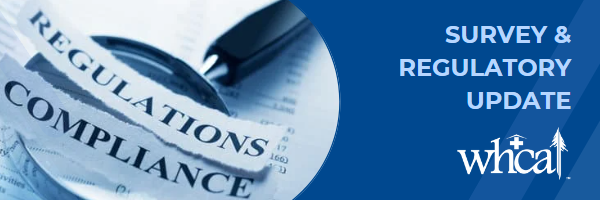Sept 3 2021 | State Enforcement Remedies for SNFs
Civil fines or Civil Monetary Penalties (CMP) are the most common state enforcement. Except as otherwise provided in statute, the range for a per-day civil fine is $50 to $3,000 and the per-instance civil fine is $1,000 to $3,000. In the event of continued noncompliance, nothing prevents the Department from increasing a civil fine up to the maximum amount allowed by law.
Accrual of a per-day civil fine begins on the first date the Department verifies that the facility has or had a specific deficiency. Accrual of the per-day civil fine will end on the date the Department determines the facility corrected the deficiency. A per-instance fine may be assessed for a deficiency, regardless of whether the deficiency had been corrected by the time it was first identified by the Department.
Civil fine(s) are due 20 days after the facility is notified of the civil fine(s) if the facility does not request a hearing. If a hearing is requested, the civil fine(s), including interest if any, is due within 20 days after a hearing decision ordering payment of the fine(s) becomes final in accordance with chapter 388-02 WAC.
If a facility fails to pay a civil fine when due, the Department may withhold an amount equal to the fine plus interest, if any, from the facility’s Medicaid payment, impose an additional fine, or suspend the nursing home license under WAC 388-97-570.
A state-issued Stop Placement order is often confused with the Federal enforcement action of Denial of Payment for New Admissions (DPNA). These actions are entirely different. DSHS must impose a stop placement when required by RCW 18.51.060 and WAC 388-97-4460 and may impose a stop placement as an optional remedy in accordance with WAC 388-97-4480. The Department’s stop placement order becomes effective upon verbal or written notice.
The facility has the right to an Informal Department Review (IDR) to refute the state deficiencies cited as the basis for the stop placement. However, the Department will not delay or suspend a stop placement order because the facility requests an administrative hearing or IDR. The stop placement must remain in effect until the Department terminates the stop placement or the stop placement is terminated by a final agency following appeal.
According to the requirements, the Department must terminate the stop placement when:
- The facility states in writing that the deficiencies necessitating the stop placement action have been corrected; and
- Within 15 working days of the facility’s notification of correction to the Department, the Department staff confirm by on-site revisit that:
- The deficiencies that necessitated the stop placement action have been corrected; and
- The facility exhibits the capacity to maintain adequate care and services and correction of deficiencies.
After the stop placement, the Department may continue to perform on-site monitoring visits to verify that the facility has maintained correction of deficiencies.
Additional information and resources can be found on the ALTSA website, including the DSHS Operating Procedures, DSHS Request for Administrative Hearing Form, and a DSHS/RCS webinar recording regarding SNF Enforcement Remedies. If you have questions, please contact Elena Madrid.
Posted in Skilled Nursing Facilities, Survey & Regulatory

